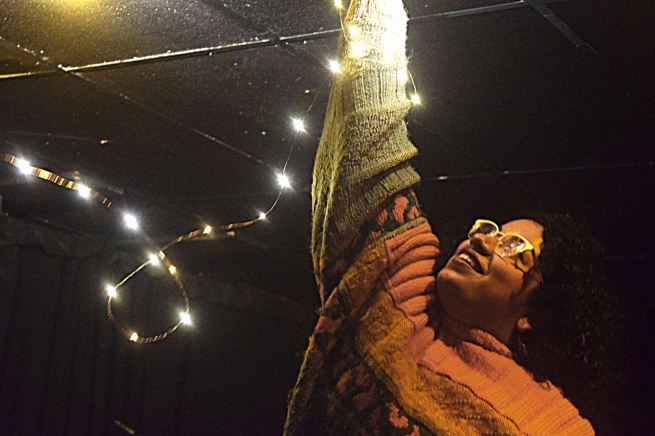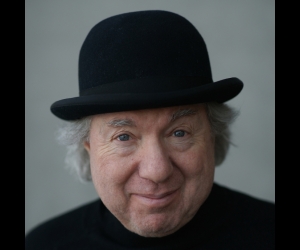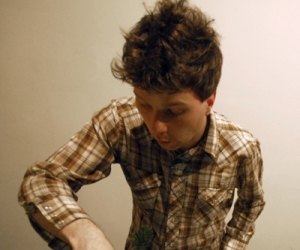
The music of Thanya Iyer (the name of the musician–composer as well as of her band) is impossible to define—both for her fans and for herself. “I can’t really place the genre of the music that we’re trying to do,” acknowledges Iyer from her home in Montreal. “For us, it’s ever-evolving. We do a lot of improvising, so it’s always changing. Within the band there’s a lot of trust, and we give each other room to explore, create, and bring in each other’s influences.”
As a child, Iyer studied piano, violin, and South Indian Classical singing. Her parents infused her family life with music; they regularly saw South Indian artists in concert, while her mother encouraged them to study music, and her father sang throughout their home. Through high-school music programs, CEGEP (Vanier College), and university (where she majored in music and science) she was introduced to diverse sounds—from fiddle music and jazz to classical violin and world music. These defining years continue to inform her work and feed into her creative circle. “It’s where I met the community I still work with today,” she says.
Nowadays, improvising on the piano and practising early-morning free writing—Iyer says the space between wakefulness and sleep finds her less self-critical—are key approaches in her exploration of music. But her most valuable tool is collaborative creation. That’s what drives the artist and defines the Thanya Iyer sound.
The following interview has been condensed and edited.
MUSICWORKS: How far along is the next album?
THANYA IYER: All of the music for the next album is written—except for the improvisational work that will be done hands-on with our collaborators. We are calling it Kind: being kind to your pain, kind to others who have different ways of seeing; and the many dimensions of humankind. The themes of the songs travel through stories of healing, racism, chronic pain and disability, aging, and acceptance. We are in the recording process. So far, myself [and bandmates] Daniel Gelinas and Alex Kasirer-Smibert have recorded drums, bass, synth, and violin for most of the songs. We have quite a bit more work to do to shape the songs before we bring out all the special guests on the album, which will include our two other bandmates, Shaina Hayes [vocalist] and Simon Millerd [trumpet], MAWMZ choir [an all-female experimental choir of Montreal vocalists and songwriters, featuring Brigitte Naggar, Sarah Rossy, and Shelby Cohen], Felix Del Tredici [classical trombone player], Devin Brahja Waldman [saxophone], Anh Phung [flute]. All of these guests lead their own wonderful projects as well.
MW: What you call “collage style” is an important approach in your music. How does it work?
TI: On our first album, Do You Dream?, we explored a collage style. Daniel, our drummer, who also engineered the album, had been recording all of our rehearsals, as well as field recordings and sounds from nature. He used these to make different themes to weave the songs together.
We were playing a lot on tour after the release of the album and that led us to further explore the collage style that we created with the album. We used improvisation to weave our way through the song arrangements and through different songs as well. This led me to want to record the mixtape of our first album, Do You Dream? Mixtape, which is an eighteen-minute live recording featuring MAWMZ choir. I wanted to capture what we do during the show.
We also had various opportunities to combine our music with different visual artists, including Elysha Poirier and Andrés Miramontes. Thanya Iyer Band has fallen in love with the role of film and visuals as an extension of our message through key projects, including through the True/False Film Festival and through our previous work creating a short film with filmmaker Bucky Illingworth and Elysha Poirier. These kinds of collagey visuals have been a big influence and have led us toward soundscapes. Along with releasing the album in traditional formats we will also condense it into a twenty-minute film that uses animation, live footage, stop-motion, and other visual elements.
MW: You mention creating “ever-evolving sounds.” Does that mean that an album, or a song, is never quite finished for you, because whenever you perform or revisit a song you find new spaces in it?
TI: That’s what it means. I would say that the song is finished. But we like to keep it loose, free, and give it the ability to evolve.
MW: Do you have an instrument or even a room that helps you create?
TI: I teach music lessons at a music school, so in the breaks a lot of the songwriting happens. This summer I had access to a café across the street with a beautiful grand piano. The owner gave me a key to come play before the café opened, so I would play in the morning for an hour. That room was just really inspiring and the piano was really inspiring to use in writing.
MW: Are there new sounds you’re gravitating to on Kind?
TI: In the first album, I found myself gravitating to more electronic sounds. Now I feel I’m returning to more earthy and acoustic sounds, like strings, brass, and voice.
AUDIO: "Sail Away," composed and performed by Thanya Iyer. From the album Do You Dream? (2016).
Photo of Thanya Iyer by by Robert Del Tridici.


